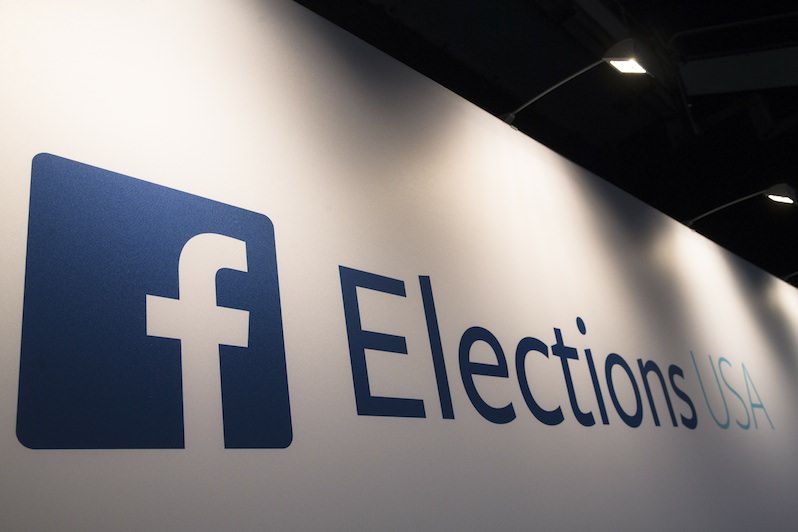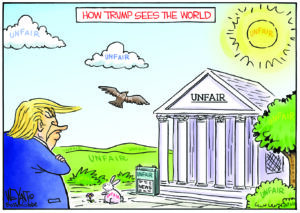Facebook Is Diving Into the Presidential Race. Yes, You Should Be Worried.
Experts say, for instance, that if the social media behemoth knows you're a liberal woman in Oregon who wants to protect the environment, it can tailor ads to make a politician appear to be in line with your ideals, even if that isn't entirely the case. John Minchillo / AP
John Minchillo / AP
John Minchillo / AP
It isn’t news that presidential candidates are logging on to Facebook to rustle up followers and spread their messages. What is new, as The New York Times recently reported, is how involved Facebook is getting in providing social media services to those candidates.
In the past three years, the company has doubled its political team, according to the Times. New video capabilities on the site and the ability to upload voter files are said to be two of the most important features that the social media giant is providing to the campaigns. What will likely have the biggest impact is how these candidates advertise on the popular platform. Facebook has already made news with its breakdown of data concerning how many people are talking about certain candidates in specific geographical areas, and that’s likely just the beginning.
“They provide something that political campaigns have wanted for, really, as long as there [have] been political campaigns, which is a really precise way to target the people they’re interested in talking to,” Chris Calabrese, the vice president of policy at the Center for Democracy and Technology, told Truthdig.
Facebook collects a massive amount of data from users, and the information candidates can use from that data is extremely valuable to a campaign. Calabrese doesn’t believe Facebook is selling or sharing user information directly, as that data is too valuable to Facebook, but the company is likely having candidates pay to have Facebook show targeted ads based on the data it has collected.
“If they see you’re talking about wind surfing, they can infer you’re probably interested in water sports and recreation generally,” he said. “They also know a lot that they can infer from who we are friends with and who we contact—the people we’re closest to. They infer things from our network.” If most of the people you regularly contact are of a certain mindset and cultural background, then Facebook can be pretty sure that you’re similar to them in certain ways that its system can figure out.
This is a concern, Calabrese said, because it could completely change the playing field in the political arena. If Facebook knows you’re a liberal woman in Oregon who wants to protect the environment, it can tailor ads to make a politician appear to be in line with your ideals, even if that isn’t entirely the case. “The danger is that you can be all things to all people,” Calabrese said. “Ultimately, if you’re sort of saying radically different things about your positions, not changing them but emphasizing them in very different ways, it’s going to be much harder for individuals to assess you as a candidate.”
Say, for example, that good ol’ Donald Trump has said he’s interested in protecting a certain wildlife refuge (for whatever reason), but overall he’s not a huge fan of maintaining environmental standards and regulations. Facebook could just focus on the one time he said something you might agree with and show you that information.
Daniel Kreiss, an assistant professor in the School of Media and Journalism at the University of North Carolina at Chapel Hill, said he’s not particularly concerned about targeted advertising. “It’s really hard to create personalized communications for individual people,” he told Truthdig. Kreiss said it would take far too much manpower and time to create very specific advertisements for so many users and that it’s more likely the ads will target general groups such as environmentalists, people against taxes or people with an interest in health care. “The way I tend to look at this is that it will enable campaigns to really make an appeal and break through the rest of the noise and clutter that goes on around elections,” he said. Perhaps a candidate who is getting slammed over something innocuous on television will be able to deliver a clearer message over Facebook.
Kreiss also said he doesn’t foresee any privacy concerns that are any different from the concerns some people already have when it comes to advertisers using people’s browsing habits to target people. “I don’t think it raises any fundamentally new questions outside of the broader context of the debate over privacy we’ve been having for a longer period of time,” he said.
Calabrese believes one step that should be taken to increase transparency and help voters make educated decisions is to have some kind of disclaimer on political Facebook ads that explains why the person is receiving the advertisement. “You’re seeing this because you follow the NRA and have identified yourself as a Republican,” one disclaimer might say. In that way, people might at least realize they are being targeted and why.
One thing everyone seems to agree on is that this is a growing industry, and business models like the one Facebook is pioneering will likely shape the future of political advertising. For better or worse, political campaigns are about to become more streamlined and effective than ever before.
That being said, we will at least be able to Google any claims made in those ads to try to figure out if they are accurate or not.
Facebook and several presidential candidates contacted by Truthdig did not respond to requests for comment by publication time.
Your support matters…Independent journalism is under threat and overshadowed by heavily funded mainstream media.
You can help level the playing field. Become a member.
Your tax-deductible contribution keeps us digging beneath the headlines to give you thought-provoking, investigative reporting and analysis that unearths what's really happening- without compromise.
Give today to support our courageous, independent journalists.






You need to be a supporter to comment.
There are currently no responses to this article.
Be the first to respond.